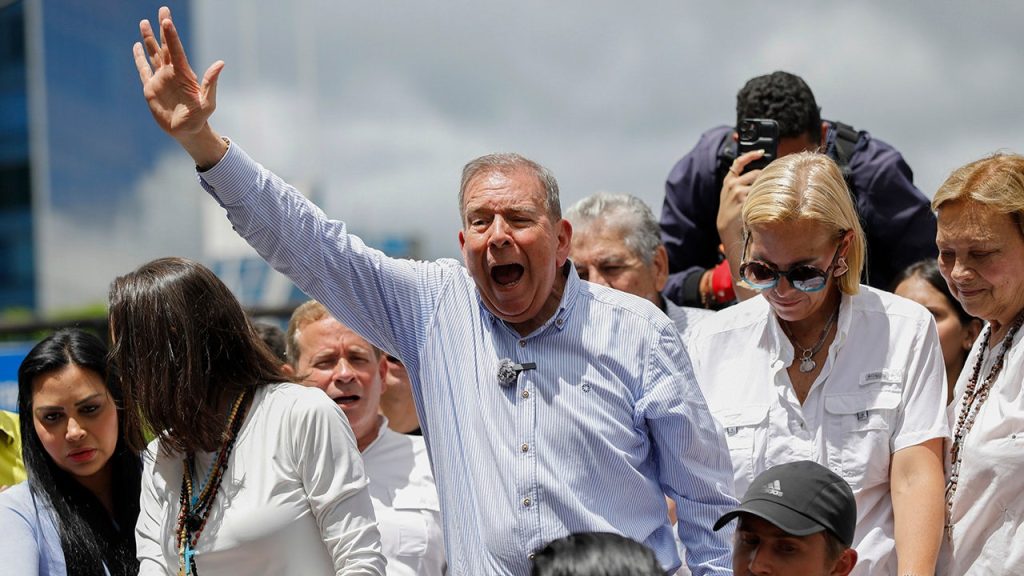Edmundo González Urrutia, the Venezuelan opposition leader who claims victory in the disputed July 2023 presidential election, embarked on a diplomatic offensive to garner international support for his cause. His primary objective was to secure the removal of incumbent President Nicolás Maduro before the commencement of the next presidential term on Friday. González Urrutia’s tour of the Americas began with visits to Uruguay and Argentina before culminating in a crucial meeting with President Biden at the White House. This meeting served as a platform to present his case to the United States and solicit their backing in his struggle to uphold what he considers the legitimate outcome of the Venezuelan election.
The meeting between González Urrutia and President Biden was described as “long, fruitful, and cordial” by the Venezuelan opposition leader. He expressed gratitude for the U.S. government’s ongoing support in his fight to restore democracy in Venezuela. The White House, in an official statement, affirmed the shared commitment to this goal. President Biden highlighted the courage of millions of Venezuelans who voted for change in the July election, citing the collection of voting tally sheets indicating that González Urrutia had secured a substantial majority. Both leaders underscored the paramount importance of respecting the will of the people, as expressed through a transparent and accountable electoral process. They agreed that González Urrutia’s apparent victory should be honored through a peaceful transition back to democratic rule.
The White House statement also addressed the escalating concerns over the Maduro regime’s repression of peaceful protesters, democracy activists, and civil society. President Biden reiterated the U.S.’s unwavering support for Venezuela’s democratic aspirations and pledged to hold Maduro and his representatives accountable for their anti-democratic and repressive actions. This commitment extends to collaborating with democratic allies both within the hemisphere and globally to apply pressure on the Maduro regime. The meeting served as a clear signal of the Biden administration’s stance on the Venezuelan political crisis and its support for the opposition’s claims of electoral fraud.
González Urrutia’s efforts to mobilize support extended beyond his meeting with President Biden. Prior to his arrival in Washington, his team rallied Venezuelans in the area to demonstrate outside the Organization of American States, further emphasizing the international dimension of the Venezuelan crisis. This public display of support coincided with the National Assembly’s invitation to Maduro to be sworn in for a sixth term, a move that the opposition vehemently opposes. The upcoming inauguration, scheduled for Friday, five months after the National Electoral Council declared Maduro the winner, further fuels the political tensions and underscores the urgency of González Urrutia’s appeals for international intervention.
The disputed election results lie at the heart of the Venezuelan political crisis. Unlike previous presidential elections, detailed vote counts were not provided by election officials, raising suspicions of manipulation. The opposition, however, obtained tally sheets from a significant portion of the electronic voting machines and published them online, claiming these documents prove González Urrutia’s landslide victory. These claims are bolstered by the Carter Center, invited by Maduro’s government to observe the election, which validated the authenticity of the online tally sheets. This has led the U.S. and most European governments to reject the official election results and recognize González Urrutia as the legitimate winner, further isolating the Maduro regime.
The Venezuelan government, however, remains defiant. Interior Minister Diosdado Cabello dismissed González Urrutia’s claims and threatened him with arrest upon his return to Venezuela, accusing him, without evidence, of being a CIA agent. Cabello insisted that Maduro would be inaugurated for a sixth term as planned. This unwavering stance underscores the deep political divide within Venezuela and the challenges facing the opposition’s efforts to secure a peaceful transition of power. González Urrutia, facing an arrest warrant in Venezuela and a government-issued bounty, remains in exile in Spain, highlighting the personal risks associated with his challenge to the Maduro regime. His diplomatic efforts, however, continue, with his team confirming contact with the incoming Trump administration, signaling a potential shift in U.S. policy towards Venezuela. The situation remains tense and uncertain, with the future of Venezuelan democracy hanging in the balance.

